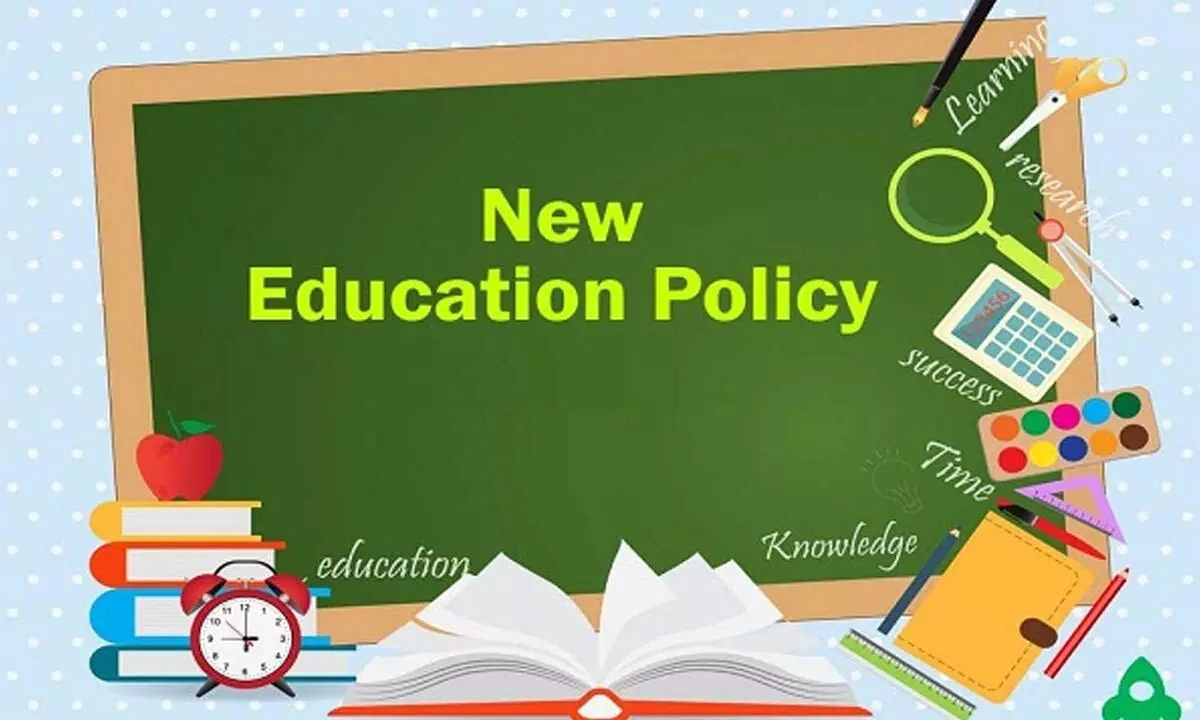NEP puts Telangana government in a bind

National Education Policy
Do SSC and Inter boards need to be merged?
Hyderabad: Telangana Government is still not clear on several aspects of the National Education Policy-2020 and hence it is tight-lipped on its implementation.
Speaking to The Hans India, a senior official in the State Education Department said, "Telangana did participate in two rounds of NEP-2020 meetings at the national level, and stakeholders' meetings were also organized by the universities, colleges with faculty and others but the Covid pandemic had put the NEP-2020 on the backburner."
According to officials, the basic change brought in by the NEP-2020 was a shift from the existing 10+2+3 system to 5+3+3+4. The pre-NEP-2020 is of 10+2 system of 14 years of schooling. Now, NEP-2020 proposes an age-wise and class-wise breakdown of the 5+3+3+4 curricular and pedagogical structure, based on the cognitive-developmental stages of the children.
Accordingly, there will be five years of the foundation stage, three years of the preparatory stage, three years of the middle stage and four years of the secondary stage. Hardly, there is any difference of opinion between the Centre and the States on the age-appropriate education proposal.
However, the issue is that implementing the NEP-2020 would bring both the SSC (Class X) and Intermediate (Classes XI and XII) under one umbrella. Does this necessitate the merging of Boards of SSC and Intermediate? There is no clarity on this issue. States like Telangana, Andhra Pradesh, and Tamil Nadu have two boards, conducting Class X and another for Class XI and XII.
Some states like Rajasthan have a Board of Secondary Education that conducts both secondary and senior secondary examinations, said an official who participated in the NEP-2020 national level meeting.
Another issue in Telangana is the foundational stage of five years from age 3 to 8 falls under the category of Anganwadi, pre-school or Balavatika under NEP-2020.
The Department of Women Development and Child Welfare has been implementing the Pre-School Education (PSE) as part of the nationwide Integrated Child Development Scheme (ICDS).
Under the scheme, the Centre had already notified implementation of national policy on Early Childhood Care and Education (ECCE), converting Anganwadi Centres as Vibrant- child-friendly 'Early Child Development Centres' (Vibrant ECDs).
Following this, the State government has made it mandatory to run pre-school from 9 am to 4 pm. For this, it has also increased the honorarium of the staff. Children are taught good habits, conversation, action songs, stories, games, creative activities, scientific activities and school readiness activities in the preschool at the Anganwadis.
Similar is the case with higher education after the secondary stage. Several state universities, private universities and national universities have been implementing several components of the NEP-2020. This includes online education in Open and Distance Learning (ODL) mode, Swayam courses to earn credit by taking online courses in each semester, Choice Based Credit System (CBCS), integrated five-year programmes (double degree scheme).
However, there are several gaps relating to the structural changes and funding patterns where more clarity is needed, officials add.

